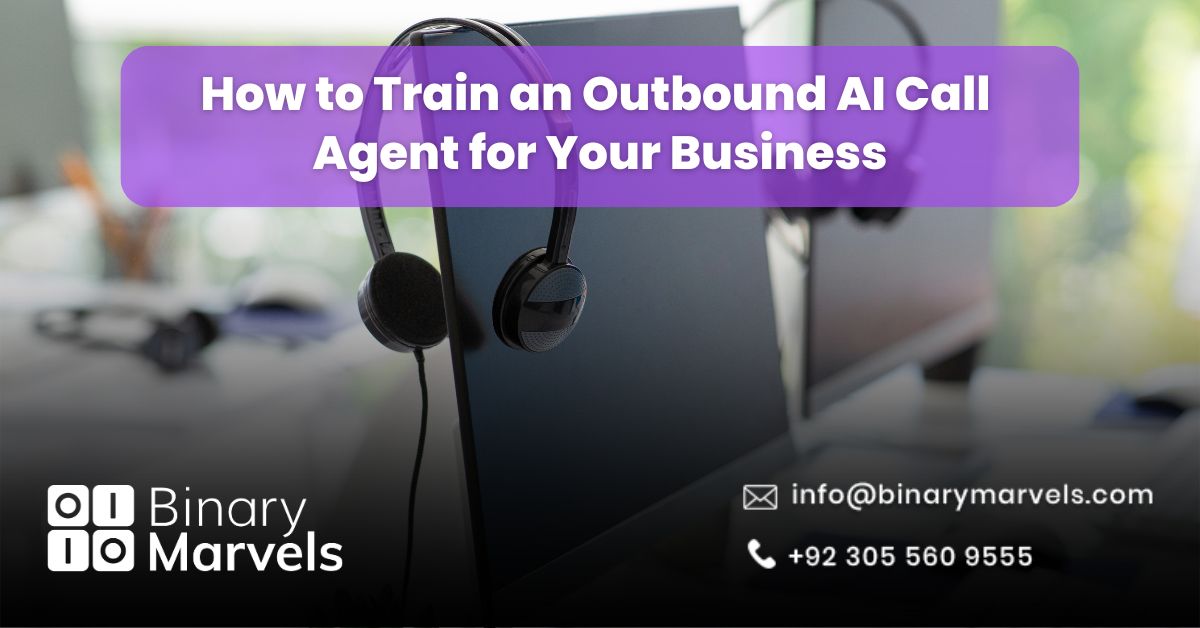
Have you ever wondered how businesses successfully train AI to make outbound calls that sound natural and engaging? Training an AI call agent is not just about giving it a script; it’s about teaching it how to understand customer intent, respond appropriately, and adapt to different scenarios.
When done right, an AI-powered outbound agent can boost efficiency, improve customer experiences, and free up your team’s time for more complex tasks.
In this guide, we’ll explore how to train an outbound AI call agent for your business step by step, ensuring it delivers the right message at the right time.
Also Read: Top 10 AI Companies in Pakistan
Understanding Outbound AI Call Agents
Before you can train an outbound AI call agent, it’s important to understand what it actually does. Unlike inbound agents that respond to customer inquiries, outbound AI call agents are designed to proactively reach out to customers for tasks such as sales calls, appointment reminders, feedback collection, and follow-ups.
The key advantage of using AI for outbound calls is consistency. An AI agent never forgets details, always follows the call script, and can handle large volumes of calls simultaneously. For businesses, this means reduced operational costs, improved customer reach, and more efficient communication.
By combining natural language processing with voice technology, outbound AI agents can hold conversations that feel human-like, making customers more comfortable and engaged. This blend of automation and personalization is what makes them a powerful tool for modern businesses.
Why Training Matters for Outbound AI Calls?
Training is the foundation that determines how well your AI call agent performs. Without proper training, the agent may struggle to understand customer intent, fail to respond naturally, or deliver a generic experience that doesn’t reflect your brand.
A well-trained outbound AI call agent can handle objections, answer common questions, and guide customers through a smooth conversation flow. It can also adapt to different scenarios, whether it’s engaging a potential lead, reminding a client about an appointment, or following up after a purchase.
When you invest in structured training, the AI becomes more than just a tool; it evolves into a reliable extension of your customer service or sales team. This ensures every outbound call adds value to your business and leaves a positive impression on your customers.
Also Read: Why Your Business Needs an AI Agent for Outbound Calls?
Step-by-Step Guide to Training an Outbound AI Call Agent
Step 1: Define Clear Objectives
Start by identifying the purpose of your outbound calls. Whether it’s generating leads, scheduling appointments, or collecting feedback, setting clear goals ensures the AI is trained to achieve specific outcomes.
Step 2: Build Conversational Scripts
Design structured yet flexible call scripts. Include greetings, common questions, possible objections, and closing statements. Make sure the language reflects your brand’s tone and values.
Step 3: Use Real Data for Training
Feed the AI with real customer interactions, past call recordings, and FAQs. This helps the agent learn how real conversations flow and improves its ability to respond naturally.
Step 4: Train for Voice Personalization
Focus on tone, pace, and clarity. An effective AI voice agent should sound approachable, confident, and empathetic, rather than robotic.
Step 5: Test and Optimize Continuously
Run pilot calls, monitor performance, and gather feedback. Regularly update scripts and responses to keep the AI aligned with changing customer expectations and business goals.
Tools and Techniques for Training
To successfully train an outbound AI call agent, you need the right tools and techniques. Advanced natural language processing (NLP) models enable the AI to understand customer intent, while machine learning algorithms help it improve with every interaction.
Integrating your AI with a CRM system ensures it has access to customer data, which allows for more personalized conversations. Analytics tools can then track call performance, monitor response accuracy, and highlight areas that need improvement.
Voice training tools are also essential, as they refine pronunciation, tone, and pacing so the AI sounds professional and engaging. With these technologies combined, your AI Voice Agent for Outbound Calls can deliver meaningful conversations that drive better results for your business.
Best Practices for Successful AI Outbound Training
When training an outbound AI call agent, following best practices ensures long-term success. Begin with small, focused call campaigns before scaling up. This allows you to refine responses, identify weaknesses, and make improvements without risking customer satisfaction.
Use customer feedback as a guide for optimization. Real-world insights help you adjust scripts, tone, and conversation flow so the AI remains relevant and effective. Regular updates to its knowledge base are also essential, as customer expectations and business goals evolve over time.
Finally, maintain a balance between automation and human oversight. While the AI handles routine interactions, human agents should be available for complex scenarios. This approach guarantees that every customer receives accurate, efficient, and empathetic service.
Also Read: Can AI Calling Agents Handle Cold Calling Effectively?
Common Challenges and How to Overcome Them
Training an outbound AI call agent comes with its set of challenges. One common issue is handling diverse accents or language variations, which can sometimes lead to misinterpretations. To overcome this, ensure your AI is trained with a wide range of voice data covering different speech patterns.
Another challenge is addressing complex queries that go beyond the AI’s programmed responses. In such cases, setting up a smooth call transfer to a human agent helps maintain customer satisfaction.
Maintaining compliance and building trust is also crucial. Outbound calls must follow industry regulations and respect customer privacy. Regular monitoring and updates ensure your AI remains compliant. For businesses seeking reliable solutions, our AI Outbound Call Solutions are designed to address these challenges effectively.
Supercharge Your Business with AI Today!
As a trusted AI Development Company in Pakistan, we deliver cutting-edge AI Development Services designed to streamline your operations and enhance customer engagement.
Don’t wait—connect with us now and take your business to the next level!
Conclusion
Training an outbound AI call agent is more than just teaching it scripts. It’s about creating a system that understands customer intent, adapts to real-world scenarios, and consistently delivers value. With the right training process, tools, and best practices, AI agents can transform outbound communication by making it more efficient, scalable, and customer-focused.
Businesses that invest in proper training not only save time and costs but also gain a competitive edge by providing smoother and more engaging customer experiences.
Ready to take the next step? Start training your AI agent today and unlock the full potential of outbound AI for your business.









